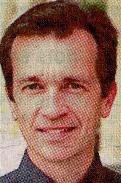Sins & Silence
Abusive Priests, Other Sex Offenders Differ
By Erik Hogstrom
Telegraph Herald [Dubuque IA]
March 8, 2006
http://www.thonline.com/story_news_frontpage.cfm?ID=110930&CFID=
510510&CFTOKEN=b92c10490db68201-D61D2B7D-BCD2-407B-60169BF6AA19F8DE
[See the main
page of the Sins & Silence series for links to all the articles and
letters to the editor.]
Sex abusers among the clergy differ from sex offenders in the general
population, a researcher has noted.
"Most of the research on sex offenders emerges out of incarcerated
clientele," said Thomas G. Plante, professor and chairman of the
psychology department at Santa Clara University in California.
He edited the book, "Bless Me Father For I [H]ave Sinned: Perspectives
on Sexual Abuse Committed by Roman Catholic Priests."
 |
| Thomas Plante |
Research suggests lower education levels are prevalent among most sex
offenders, unlike the clergy, who are highly educated.
Studies show the average IQ of priests at about 125.
"They are much smarter than the average person on the street,"
Plante said.
Determining the average IQ of the general public sex offender is difficult.
However, a study of 255 incarcerated rapists in Massachusetts from 1980
to 1990 revealed an average IQ of 100 for the offenders—the same
as that of the average American.
A 1994 national study of 160 child sex abusers, 123 incest perpetrators
and 108 sexual aggressors against adult women found that intelligence
scores of sex offenders basically were average, although verbal abilities
tended to be lower in pedophiles.
Plante has evaluated more than 35 priests or religious brothers accused
of sexually abusing minors. His research suggests 81 percent of the victims
were adolescent boys—another difference from other sex offenders.
"Most sex offenders violate girls, not boys," Plante said.
Despite the gender of victim and victimizer, psychologists don't believe
homosexuality is the root of the problem.
"We believe it is about victims of convenience," Plante said.
"(Sex offenders) often take victims of convenience."
Another difference lies in the mental health of the abuser: Although abusive
priests and abusers from the general population often have substance-abuse
problems, psychologists are less likely to find severe psychotic troubles
among abusers in the clergy.
"It takes a certain high level of functioning to become a priest,"
Plante said.
Available research suggests that approximately 2 to 5 percent of priests
have had a sexual experience with a minor.
This figure is lower than the percentage within the general adult male
population, estimated to be closer to 8 percent.
"Therefore, the odds that any random Catholic priest would sexually
abuse a minor are not likely to be significantly higher than other males
in or out of the clergy," Plante said.
He also found the vast majority of priests who sexually abuse minors commit
their first offense about a year after ordination.
"Therefore, one can only assess risk factors for this behavior when
evaluating potential applicants to the priesthood," he said.
Any original material on these pages is copyright © BishopAccountability.org 2004. Reproduce freely with attribution.